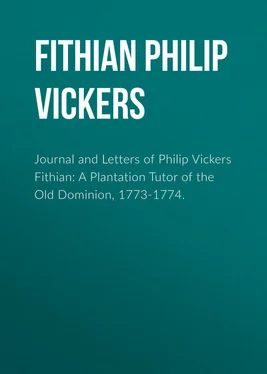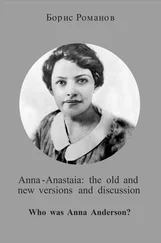Philip Fithian - Journal and Letters of Philip Vickers Fithian - A Plantation Tutor of the Old Dominion, 1773-1774.
Здесь есть возможность читать онлайн «Philip Fithian - Journal and Letters of Philip Vickers Fithian - A Plantation Tutor of the Old Dominion, 1773-1774.» — ознакомительный отрывок электронной книги совершенно бесплатно, а после прочтения отрывка купить полную версию. В некоторых случаях можно слушать аудио, скачать через торрент в формате fb2 и присутствует краткое содержание. Жанр: foreign_antique, foreign_prose, на английском языке. Описание произведения, (предисловие) а так же отзывы посетителей доступны на портале библиотеки ЛибКат.
- Название:Journal and Letters of Philip Vickers Fithian: A Plantation Tutor of the Old Dominion, 1773-1774.
- Автор:
- Жанр:
- Год:неизвестен
- ISBN:нет данных
- Рейтинг книги:3 / 5. Голосов: 1
-
Избранное:Добавить в избранное
- Отзывы:
-
Ваша оценка:
- 60
- 1
- 2
- 3
- 4
- 5
Journal and Letters of Philip Vickers Fithian: A Plantation Tutor of the Old Dominion, 1773-1774.: краткое содержание, описание и аннотация
Предлагаем к чтению аннотацию, описание, краткое содержание или предисловие (зависит от того, что написал сам автор книги «Journal and Letters of Philip Vickers Fithian: A Plantation Tutor of the Old Dominion, 1773-1774.»). Если вы не нашли необходимую информацию о книге — напишите в комментариях, мы постараемся отыскать её.
Journal and Letters of Philip Vickers Fithian: A Plantation Tutor of the Old Dominion, 1773-1774. — читать онлайн ознакомительный отрывок
Ниже представлен текст книги, разбитый по страницам. Система сохранения места последней прочитанной страницы, позволяет с удобством читать онлайн бесплатно книгу «Journal and Letters of Philip Vickers Fithian: A Plantation Tutor of the Old Dominion, 1773-1774.», без необходимости каждый раз заново искать на чём Вы остановились. Поставьте закладку, и сможете в любой момент перейти на страницу, на которой закончили чтение.
Интервал:
Закладка:
Life in the Tidewater during the Golden Age was dominated, to a remarkable extent, by families possessing vast estates. Not everyone, it is true, owned such princely domains as the Carters or Fitzhughs, but men in their station were imbued with a deep sense of their obligation to society. They sat as justices in the county courts, served as sheriffs and as colonels of the militia in their counties, and acted as vestrymen and church wardens in their parishes. They accepted seriously their duty to preserve the peace and watch over the less fortunate classes. Because of their wealth and position, their education, resourcefulness and keen sense of public responsibility, they were able to influence and to impress their ideals and tastes upon the community in a measure rarely equalled by a similar aristocracy.
The great landed proprietors operated their estates in either of two ways or a combination of the two. They might take full responsibility themselves, planting tobacco and secondary crops; they could lease tracts to others to cultivate; or they might do both. Sometimes a man leased more of his arable lands than he reserved for his own use. Though disturbed conditions in Europe and the burdens imposed by the British regulatory system led to repeated attempts to develop other staples for export, tobacco continued to be the mainstay. Aside from money crops, however, the great landowners had to supply numerous foodstuffs and other commodities needed on their plantations.
A proprietor customarily resided on what was generally known as the "manor plantation." [2] Footnote_2_2 In the issue of the Virginia Gazette for May 24, 1751, Thomas Eldridge of Prince George County advertised the sale of his "Mannor Plantation" and three other plantations. Such references to manor plantations appeared frequently in the Gazette and in the wills of the period.
This seat usually served as the nerve center of the activities of his entire estate, with the other units subordinate to it. Not infrequently some of the outlying properties were devoted to producing commodities needed by the manor plantation and by such other plantations as were engaged in raising tobacco and other marketable staples. Overseers or stewards managed the units over which the owner found it difficult to exercise personal supervision. These men reported to him at regular intervals to receive instructions and give an account of their stewardship.
Though the basis of life was agricultural, the great landowners discharged a wide variety of other economic functions. They served as factors for their neighbors, buying their crops, selling them supplies, and providing them with credit facilities. Many sent vessels regularly up and down the Chesapeake and the Virginia rivers, purchasing the produce of others for later marketing. In like fashion they brought manufactured goods from overseas for sale in the plantation stores. When European conditions interfered with the import trade, enterprising men frequently set up grist mills, textile factories, foundries, and other manufactories on their plantations, to supply their own and their neighbors' needs.
The great Tidewater proprietors of the Golden Age were, then, no perfumed courtiers spending their days in idleness and diversion and consciously seeking to avoid all "taint of trade." In a very real sense they were capitalists, acute men of business, seriously concerned with managing their estates, tilling their lands and disposing of their produce, and eager to reap a profit through trading with their neighbors. Their ledgers and their correspondence reveal their energy, shrewdness, and enterprise. In a similar way the constant stream of letters they wrote the factors who served them in London, Bristol, and other ports of the mother country show their vital interest in conditions in the world market.
The planters' preoccupation with such matters does not signify that they lacked grace of living, nor that they were deficient in aristocratic ideals. They were determined they should not revert to barbarism in the wilderness. At no time did they allow themselves to forget that they were inheritors of British civilization. [3] Footnote_3_3 Cf. Wright, Louis B., The First Gentlemen of Virginia , passim .
Taking the English gentry as their model, they tried, insofar as colonial conditions would allow, to follow the ways of the country gentlemen of the homeland. On that pattern they fashioned their manners, their homes, their diversions; and with a similar aim they sought to acquire, and instruct their sons in, every branch of knowledge useful to a gentleman.
That it was a constant concern of these planter-businessmen to see that their children should acquire "polite" accomplishments is clearly revealed in their papers. In a letter in 1718 Nathaniel Burwell of "Carter's Grove" deplored his son's inattention to his studies, not only because an ignorance of arithmetic would hamper him in "the management of his own affairs," but also because, lacking a broad basis of knowledge, he would be "unfit for any gentleman's conversation and therefore a scandalous person and a shame to his relations, not having one single qualification to recommend him." [4] Footnote_4_4 William and Mary College Quarterly , Vol. VII, series 1, p. 43.
In a like spirit William Fitzhugh of "Bedford" in Stafford County asserted in 1687 that his children had "better be never born than illbred." [5] Footnote_5_5 Stanard, Mary Newton, Colonial Virginia , p. 271.
Though a parent sometimes specified that his sons be taught languages, philosophy, dancing, fencing, and other such "polite" subjects, practical studies were not neglected. Such subjects as mathematics, surveying, and law prepared a youth for managing the estate he would one day inherit and for discharging the obligations to society imposed by his position. The goal was not professional specialization, but, rather, an education which would develop fully every side of a gentleman's character. George Washington expressed this ideal in referring to plans for the education of his ward, young "Jacky" Custis, in 1771. Admitting that "a knowledge of books is the basis upon which other knowledge is to be built," he explained that he did not think "becoming a mere scholar is a desirable education for a gentleman." [6] Footnote_6_6 Hornsby, Virginia Ruth, "Higher Education of Virginians," p. 10. Typed M.A. Thesis, Library of the College of William and Mary.
Thus, also, Robert Beverley, father of Harry Beverley of "Hazelwood" in Caroline County, directed in his will that his son's guardians should continue the boy's education until he should be taught "everything necessary for a gentleman to learn." [7] Footnote_7_7 William and Mary College Quarterly , Vol. XX, series 1, p. 437.
Books provided a ready means of transmitting English standards of life to the colony. The carefully selected volumes in the manor houses clearly reveal their owners' aspiration to become "compleat gentlemen." It was not unusual for the collection of a prosperous planter to number as many as one or two thousand. Works providing guidance in the mode of life they admired greatly predominated, though works of literature were not absent. English "courtesy" and "conduct" books were on every gentleman's shelves. Richard Allestree's A Gentleman's Calling and Henry Peacham's The Compleat Gentleman , and other works which portrayed fortitude, prudence, temperance, justice, liberality, and courtesy as cardinal virtues appear again and again in the inventories of the period, along with the writings of Castiglione and other Italians of an earlier day from whom English authors had derived ideas of courtly conduct.
Most numerous were works stressing a gentleman's religious obligations. Duty to God and Church was set forth in devotional works of various kinds, collections of sermons, and theological treatises. Then came books on historical subjects which offered actual examples of men of great deeds. There were also many volumes on politics and statecraft and military manuals, all of them useful in teaching the larger obligations which a man of wealth owed to society. Guidance in the practical duties of a great estate was furnished in treatises on various phases of farming and gardening, manuals of medicine and surgery, books on surveying and engineering, commentaries on law and legal procedure and handbooks of architecture. [8] Footnote_8_8 Cf. Wright, First Gentlemen , passim .
Интервал:
Закладка:
Похожие книги на «Journal and Letters of Philip Vickers Fithian: A Plantation Tutor of the Old Dominion, 1773-1774.»
Представляем Вашему вниманию похожие книги на «Journal and Letters of Philip Vickers Fithian: A Plantation Tutor of the Old Dominion, 1773-1774.» списком для выбора. Мы отобрали схожую по названию и смыслу литературу в надежде предоставить читателям больше вариантов отыскать новые, интересные, ещё непрочитанные произведения.
Обсуждение, отзывы о книге «Journal and Letters of Philip Vickers Fithian: A Plantation Tutor of the Old Dominion, 1773-1774.» и просто собственные мнения читателей. Оставьте ваши комментарии, напишите, что Вы думаете о произведении, его смысле или главных героях. Укажите что конкретно понравилось, а что нет, и почему Вы так считаете.












